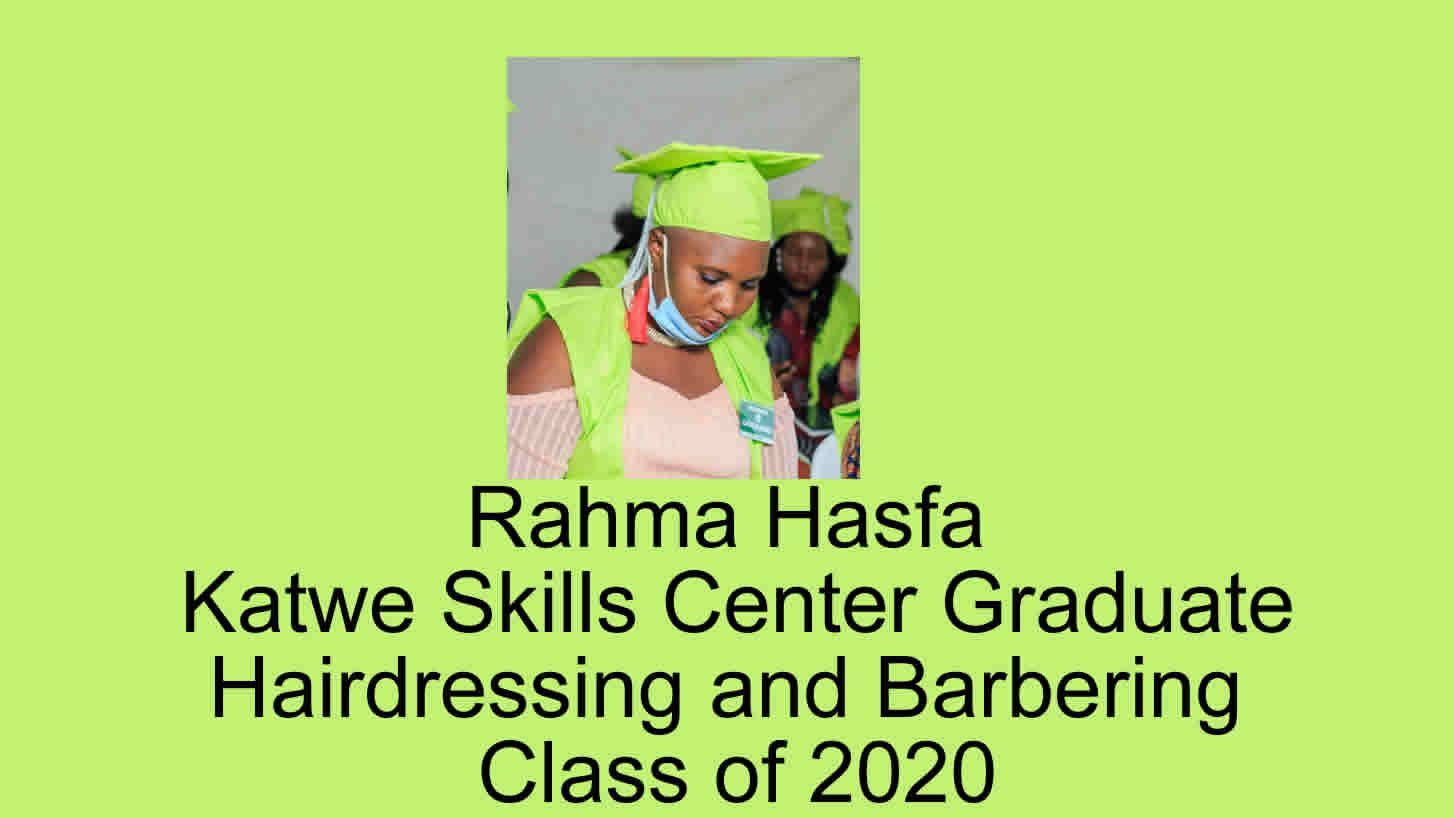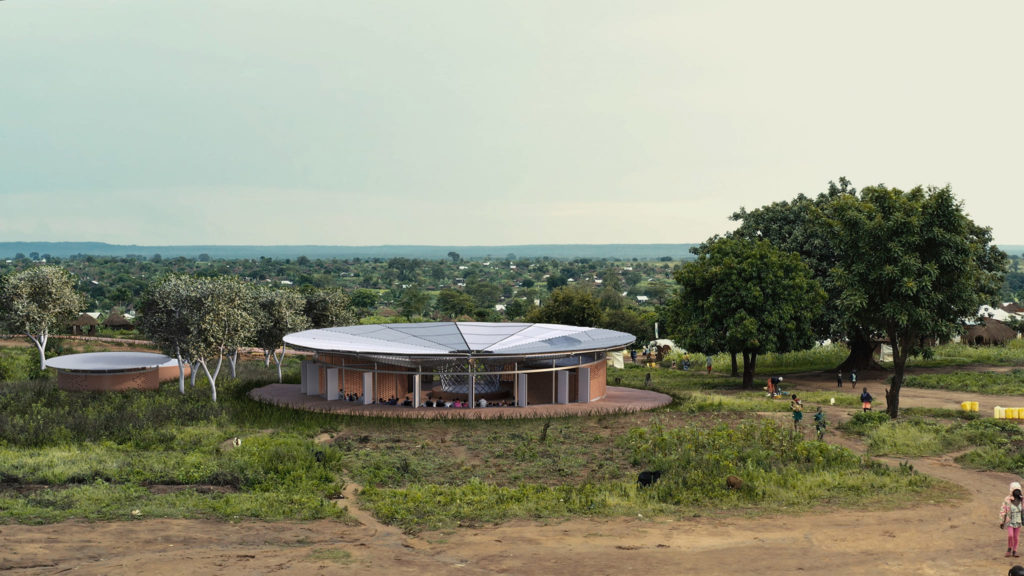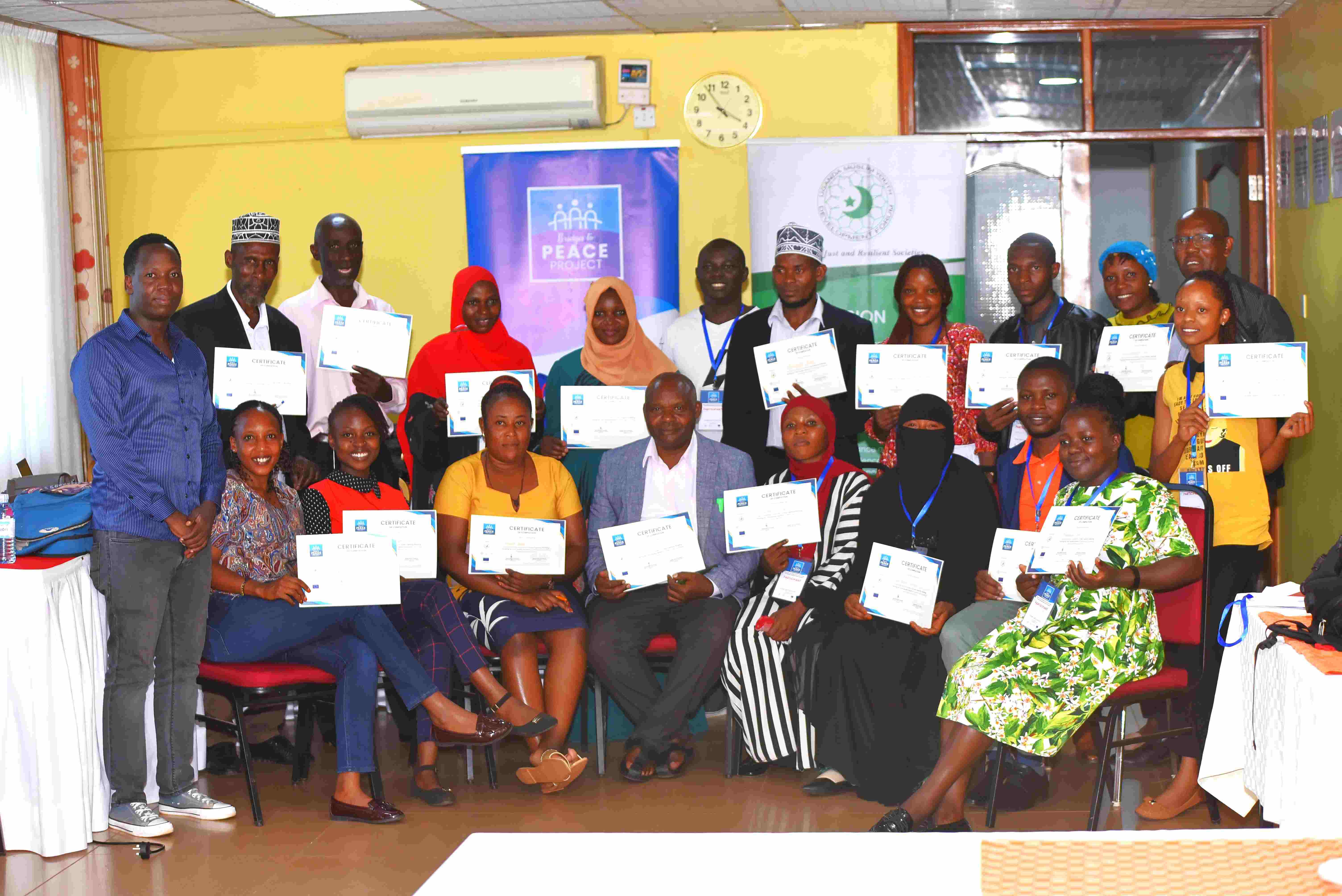
Photo: CSO Representatives During the Three-Day Capacity Building Workshop.
As part of our efforts to reduce incidents of violent extremism and support for such acts in Uganda, we are partnering with the Kofi Annan Foundation, with funding from the European Union for the Bridges to Peace Project...
The Bridges to Peace Project was designed to complement the Government’s actions to Prevent and Counter Violent Extremism and Terrorism in Uganda through broadening community awareness, vigilance and preparedness against violent extremism; strengthening the capacity of at-risk individuals and communities to work for peace; enhancing the interest and capacity of CSOs to design and implement effective P/CVE interventions; and strengthening the country’s capacity to reintegrate returning combatants.
To achieve our goal, We have extended our partnership to local CSOs (Civil Society Organisations) through a capacity-building approach, We followed a specific process to select four CSOs that are implementing PCVE pilot projects in their respective areas of operation.
STAGE 1: "A group of 28 civil society organizations representatives from Kampala, Lwengo, Masaka, and Bugiri participated in a three-day residential training program focused on strategies to prevent and counter violent extremism. UMYDF organized the program in partnership with KAF as one of the many activities under the Bridges to Peace Project being funded by the EU in Uganda."
STAGE 2: The 28 trainees were extended an invitation to participate in a competitive initiative aimed at designing and implementing pilot projects centred on Preventing/Countering Violent Extremism strategies. The competition offered a grand prize of Euro 6,000 and required the trainees to apply their knowledge and expertise in designing effective P/CVE pilot projects.
STAGE 3: 15 members of the trainees submitted a set of concepts to UMYDF and KAF organizations.
STAGE 4: Following a comprehensive three-week review and screening process conducted by a collaborative team of experts from UMYDF and KAF, four outstanding proposals for P/CVE projects were selected as the finalists. Each selected finalist was awarded a grant of Euro 6,000 to pilot their proposed project. The selection process was rigorous and thorough, and the chosen projects reflect the highest standards of innovation, feasibility, and potential impact. We are confident that these projects will make a significant contribution to the field of P/CVE and look forward to seeing their progress and outcomes.
STAGE 5: The winning groups were invited to attend a two-day workshop where our staff assisted with refining the problem statements and envisioning change, stating project goals, describing activities, outlining the theory of change, stating expected impact, and developing the M&E plan. Additionally, we offered training on project management tools such as narrative reporting templates, minutes, work plans, registration forms, consent forms, budgets, financial reporting templates, financial guidelines, and accountability checklists. We also addressed cross-cutting issues such as risk management, gender, consent and privacy, schedule management, stakeholder management, communication, and visibility.
The CSOs (Civil Society Organizations) which won the Sub Grants have been doing some incredible work in their respective areas. Briefly read about them and the work they are doing below:
- Kisoboka Africa Lwengo
Founded in 2017, Kisoboka Africa has been tirelessly working towards the economic empowerment of youth and women in Lwengo district. Their efforts have been commendable, in their capacity, they have managed to equip close to 3000 beneficiaries with business skills and helped them form savings groups to be able to access funds for investing in small businesses. The impact of their work is evident as they have helped beneficiaries start over 1000 small businesses. This has led to beneficiaries generating incomes to meet their needs, which in turn has significantly reduced the chances of them engaging in violent extremism.
Their mission is “to create economic opportunities for women, youth, and children for improved livelihoods”.
The proposed PCVE Pilot Project has been titled “Building Economic Resilience among Youth in Lwengo District to Prevent Violent Extremism”.
The goal of the project is to economically empower young people between the ages of 15 and 30 in Lwengo district while also creating mechanisms to identify elements of violent extremism to increase resilience by December 2023.
They have equipped 20 unemployed youths in Lwengo district with skills they can utilize to generate income. Through this, the organisation has empowered the Youth to be more resilient from engaging in violent extremism, They have created awareness of the need to prevent violent extremism among the youths and local leaders in Lwengo district, their project has also created mechanisms through which the community and leaders can work together to identify and prevent at-risk individuals from engaging in violent extremism in Lwengo district.
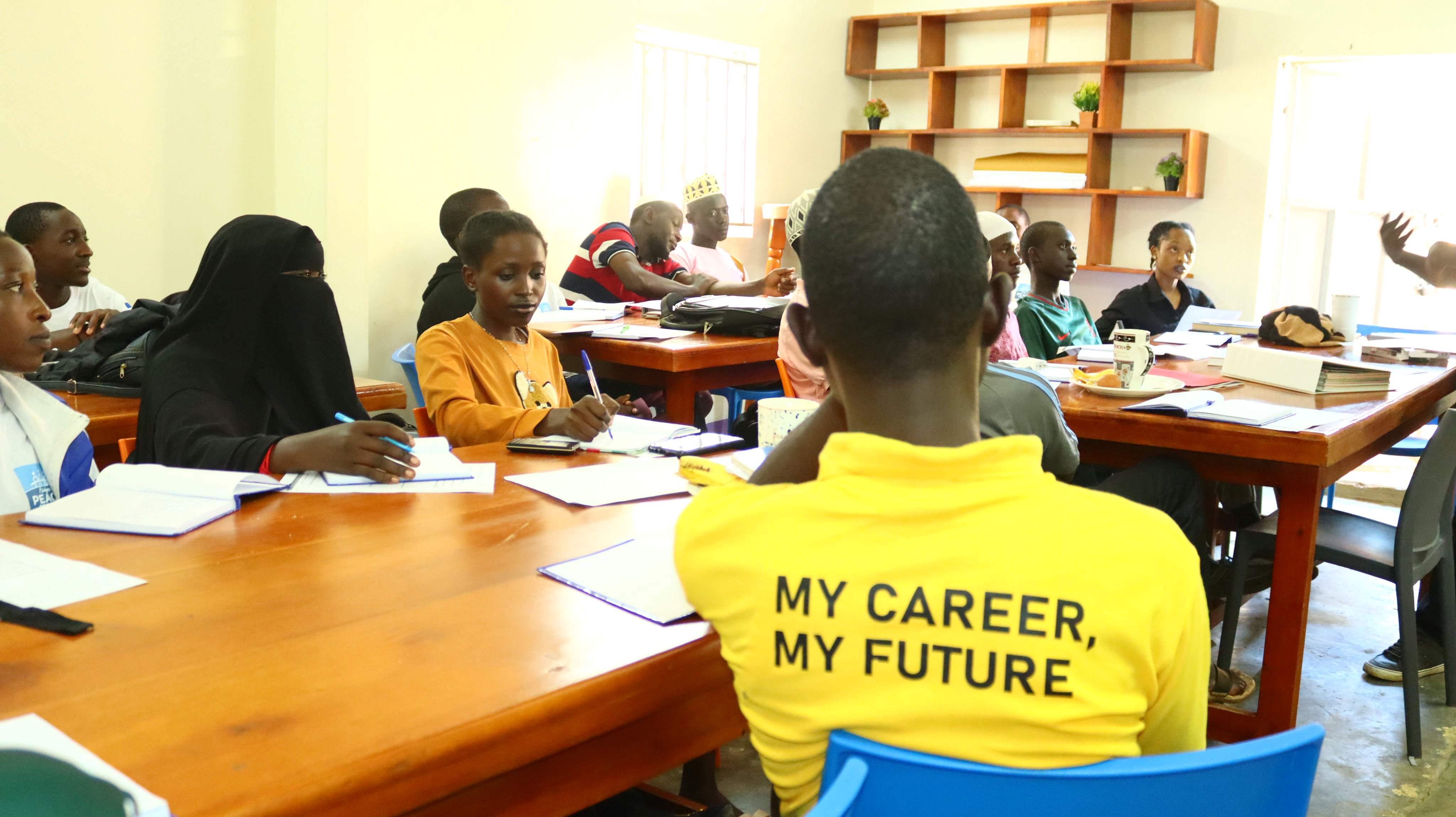
Photo: Kisoboka Uganda Project inception meeting
They held a meeting dedicated to youth economic empowerment, 21 stakeholders attended the meeting including 4 female Participants and 17 male participants. Those in attendance included the district internal security officer, one representative from CMI, the district community development officer and CDOs from Kyazanga sub-county, Kyazanga Town council and Lwengo Town Council. It also included leaders from different Salafi mosques in Kyazanga in addition to the OC/CID, and youth councillors among others.
- Centre for Religious and Inter-cultural Dialogue Kampala
The Centre for Interreligious and Intercultural Dialogue is a community-based organization located in Uganda. It aims to promote respect for diversity, tolerance, and peaceful co-existence among different religious and cultural groups. The organization was established in response to various religious and cultural conflicts that have occurred in Uganda in the past. The founders of the Centre envisioned a peaceful country and world that embraces religious and cultural tolerance to avert conflicts with a MISSION “to promote Interreligious and Intercultural Dialogue for Sustainable Development”.
The proposed PCVE Pilot Project has been titled “Building Safe and Inclusive Classrooms”
The goal of the project is to equip teacher trainees at Makerere University with skills and knowledge for creating safe and inclusive classrooms that are conducive and respectful to religious and cultural diversity. Additionally, the project aims to provide these teacher trainees with the skills to nurture young people to become agents of peace and to make schools safe learning environments. The organisation believes that teachers must possess these skills to foster an environment where students feel safe, respected, and supported in their education.
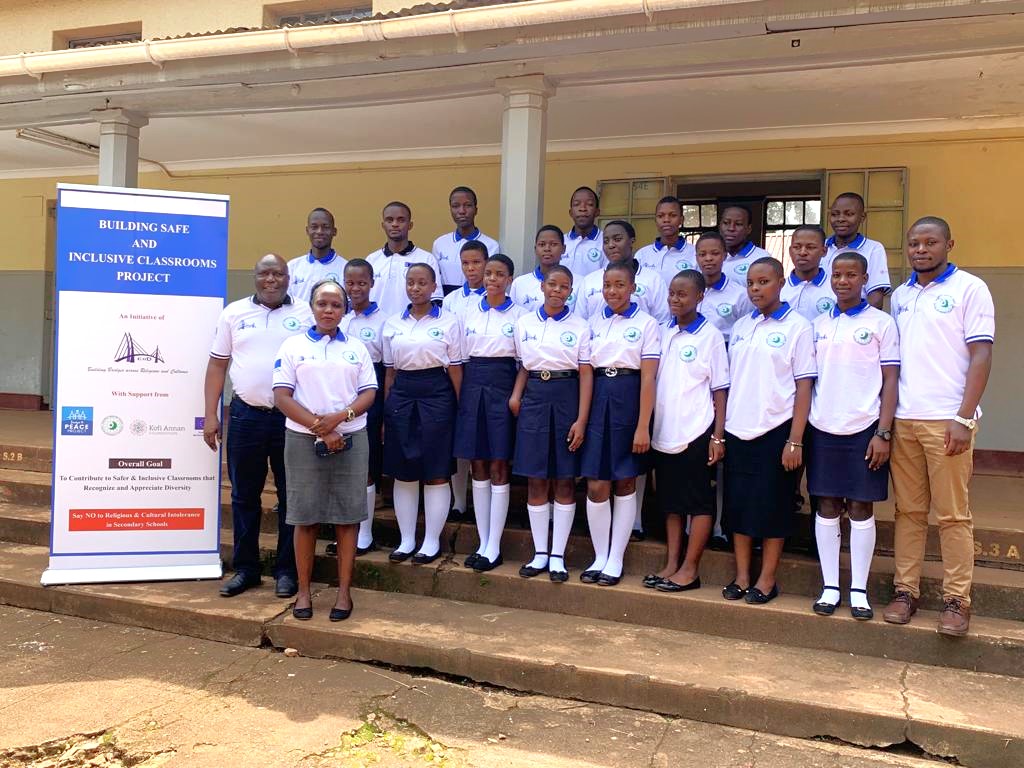
Photo: Members of the Bweyogerere SS and Old Kampala SS Prefectural Bodies During the Awareness Meeting.
They held an awareness meeting with two Prefectural bodies from two secondary schools in Kampala these included Old Kampala Senior Secondary School and Bweyogere Secondary School on the topics of religious and cultural tolerance. The meeting aimed to encourage students to become more culturally and religiously sensitive, to value and respect diversity, and to promote peaceful coexistence, each school was represented by 20 students.
During the meeting, participants discussed a range of key issues, including the importance of understanding religious and cultural tolerance, the negative impact of religious and cultural intolerance, the need for inclusivity and respect for differences, the value of building interfaith and intercultural bridges, the role of prefectural bodies, and the importance of addressing stereotypes and biases. These discussions were aimed at promoting awareness and understanding of the importance of tolerance, diversity, and peaceful coexistence in the school environment.
- Beyond Uganda Ministries Bugiri
The institution was started by community volunteers with a strong vision to provide equal opportunities for women and children who had no chance to go to school and were living a life of no hope in Bugiri district and Uganda. The initiatives were put forward to empower women through vocational skills and education for children, and family restoration through easing access to water and shelter. It's inspiring to see how a group of dedicated volunteers can come together and make such a positive impact on the lives of those in need. with a MISSION of empowering women, educating children, and restoring families.
The proposed PCVE Pilot Project has been titled: “Eliminating the Incubation of Violent Extremism Activities in Bugiri District”.
Their objective is to contribute to the elimination of the incubation of violent extremism in the communities of Bugiri District
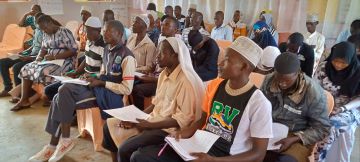
Photo: Namayemba Youth During the Sensitisation Workshop.
They have conducted an inception meeting which was conducted to inform and engage duty bearers and responsible stakeholders on the project's overall objectives, to seek their input and also ask them to rally their support behind Beyond Uganda during the project implementation.
They have also conducted Youth sensitization on government economic programs targeting youth who are at risk and exposed to violent extremist activities in Namayemba Town Council to create awareness of government economic programs and projects, this activity is aimed at promoting Youth engagement in the Government Development Project which in turn helps the Youth to build self-reliance.
- Masaka City NGO Forum
Masaka City NGO Forum is a non-profit and non-governmental organization with a MISSION of “Empowering community members out of social marginalization, human rights violation, isolation, discrimination, and economic strengthening”.
The proposed PCVE Pilot Project has been titled: “Building Peace through Sustainable Access to Socio-economic Opportunities among Youth and Women to Strengthen their Resilience in the Prevention of Violent Extremism in Masaka”.
Their project has aimed at providing financial literacy to the youth and women in the community. To begin with, they identified organized groups of women and youth and taught them financial skills such as saving. The project has conducted four outreach programs in the areas of Nyendo Kitaka, Mabeera, and Nakayiba to mentor the youth and help them grow in their respective fields. The identified youth were connected to organizations that support vocational training and related government programs, which also promote gender equality.
The project also focused on empowering women through strengthening Self Help Groups (SHGs)/Village saving. They used SHGs as a platform to engage communities and educate them against violent extremism. Additionally, the project integrated gender perspectives to prevent violent extremism and identified the factors that led young women into violent extremist groups. They have conducted education activities to promote global citizenship and provided soft skills such as life skills through school and community outreaches to target young people.
The project aimed to reduce violent extremism significantly in Masaka communities by following a Human Development Peace approach. This approach was planned to help build local capacities to support the most vulnerable groups, especially women and youth, empowering them to meet their immediate needs and secure sustainable livelihoods in ways that promote peace, stability, and gender equality.
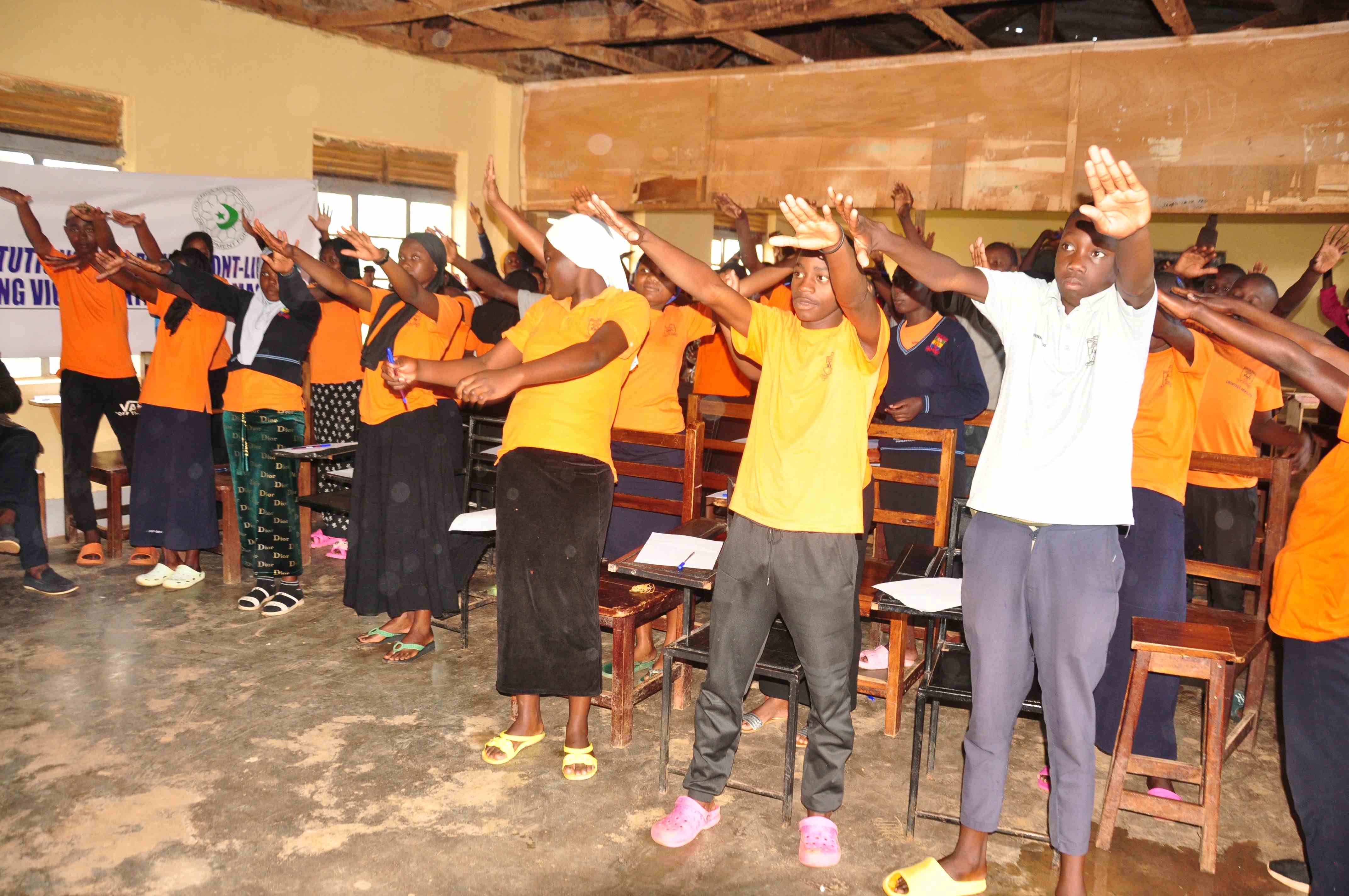
Photo: Students Participating in one of Masaka City NGO Forum activities.
The project kick-started with an Inception meeting held on 21st November at the Mayor's office in Masaka city. Key stakeholders, including the probation office, police family protection, DISO's office, technical staff of Masaka city, and RCC office, were engaged to ensure the project's success.
On 23rd November 2923, a local leader's sensitization meeting was held at the Mayor's conference hall. The meeting aimed to sensitize the leaders on violent extremism themes and positive alternatives, internet safety, and prevention of violent extremism.
Another sensitization meeting was held at Tarbuk Secondary School in Luvule Masaka District Bukakata. The meeting focused on sensitizing students on the same topics, including violent extremism themes and positive alternatives, internet safety, and prevention of violent extremism.
They engaged with Bwala Secondary School students who participated in a learning session on violent extremism, where they learned how to develop self-esteem and analytical skills for challenging potential risks towards recruiters and risky peer groups. The session aimed to equip the students with the necessary skills to protect themselves from violent extremism.
